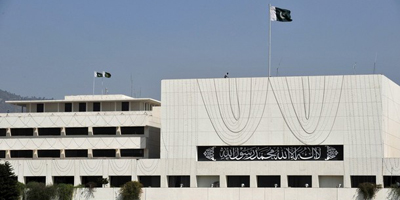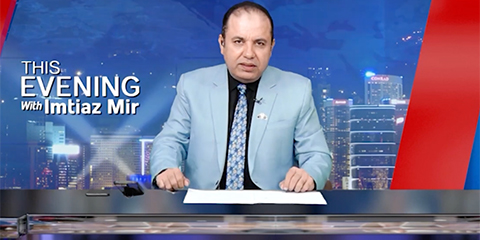
PFUJ calls for end to Impunity for Crimes Against Journalists
November 02, 2025: PFUJ urges Pakistan’s federal and provincial governments to end Impunity for Crimes Against Journalists and ensure their safety and press freedom.
JournalismPakistan.com | Published 10 years ago | Daud Malik
Join our WhatsApp channel
ISLAMABAD: Proposing to give the Supreme Court “power” to inquire about sources of journalists’ information, a draft bill - the Protection of Journalists 2014 - moved by Jamaat-e-Islami legislators in the National Assembly calls for setting up a National Press Council for “rapid resolution of journalistic problems”.
Introduced by Shaibzada Tariq Ullah, Shaibzada Muhammad Yaqub, Sher Akbar Khan and Aisha Syed, the bill says the council’s membership will comprise a member each from Pakistan Federal Union of Journalists, All Pakistan Newspapers Employees Council, All Pakistan Newspapers Society, Pakistan Broadcasters Association, Council of Pakistan Newspaper Editors and Chairman Pakistan Electronic Media Regulatory Authority.
The other members will be Secretary Ministry of Information and Broadcasting, Secretary Ministry of Interior and at least one representative of an independent media organization “registered under laws of Pakistan…”.
The main tasks of the council, according to the draft legislation, will be to give “proposals and programs to the government with reference to the protection and problems faced by the journalists during their duty” and “introduce mechanism for the solution of problems of journalists.” It will also create conducive atmosphere in order to “ensure opportunities of personal development, progress and education for the journalists working in private and public sectors”.
Further, the council will “ensure prompt implementation on the complaints of journalists.” Importantly it will also “mediate in cases related with the payment of wages and other benefits between the media owners and employees” besides holding “seminars, consultative programs, conferences and round table talks for the protection of journalists and to maintain the dignity of their work.”
Interestingly, the draft bill calls for “protection of journalists from disclosing the source of information” but in the matters which relate to national security. It proposes to give the Supreme Court of Pakistan “power” to inquire about the sources.
The law asks the government to ensure facilities and support for journalists “according to their status as the guardian of public interests for ensuring effectively the freedom of expression as provided under Article 19 of the Constitution.” It seeks cooperation of every government institution to allow journalists “enjoy the right to acquire information including the unpublished information under Article 19(a) of the Constitution.”
According to the bill, the government “will provide special protection to the persons discharging their duties as journalists in any institution (federal or provincial)…”
One of the clauses also calls for supporting women journalists against any “in-discriminatory behavior or sexual harassment in any way” and binding the institutions to “establish a separate working environment for women.”
Bemoaning the fact that 80 journalists have been killed since 2002, the bill regrets none of the killers has been nabbed or sentenced. The International Federation of Journalists says Pakistan is now the most dangerous country in the world for journalists – a situation worsened due to the high level of impunity for crimes against journalists. Of 100 cases of journalist killings since 2000 there have been only two prosecutions.
Unless backed by the treasury benches, mostly the private members’ bills lapse in the National Assembly. However, in the previous 13thNational Assembly, a number of bills moved by private members were approved by the House.

November 02, 2025: PFUJ urges Pakistan’s federal and provincial governments to end Impunity for Crimes Against Journalists and ensure their safety and press freedom.

November 02, 2025: Impunity for crimes against journalists deepens worldwide as Pakistan reports a 60 percent surge in attacks and weak enforcement of safety laws.

November 01, 2025: Pakistan Press Foundation reports 137 attacks on journalists in 2025, highlighting rising threats, legal harassment, and censorship on the International Day to End Impunity.

November 01, 2025: A viral Samaa TV clip featuring MNA Sher Afzal Marwat’s crude remarks and Talat Hussain’s laughter raises questions about the declining ethics of Pakistani television.

October 31, 2025: Police foiled a plot to kill DawnNewsTV journalist Tahir Naseer in Rawalpindi after arresting suspects hired for Rs200,000. Naseer says threats followed his reporting.

October 31, 2025: CPJ calls on Pakistan to bring Imtiaz Mir’s killers to justice after the journalist was allegedly murdered by a banned militant group in Karachi.

October 30, 2025: The PFUJ has condemned a fabricated drug case against journalist Matiullah Jan, calling it an attempt to silence him and urging authorities to quash the charges immediately.

October 30, 2025: NewsOne TV remains on air but faces mass layoffs and delayed salaries, exposing Pakistan’s worsening media crisis and financial instability.

November 02, 2025 Independent outlet All About Macau to halt print and online operations amid rising pressure, financial strain, and legal threats, sparking press freedom concerns in the city.

November 01, 2025 Belarus court jails journalist Siarhei Chabotska for extremism and defaming the president, highlighting Minsk’s ongoing crackdown on press freedom.

November 01, 2025 Mexican journalist Miguel Angel Beltran was found murdered in Durango. CPJ urges authorities to ensure justice amid rising violence against journalists in Mexico.

November 01, 2025 UNESCO survey finds one-third of media lawyers cannot effectively defend journalists due to threats, limited resources, and lack of specialization.

October 31, 2025 Radio Free Asia, a US government-funded broadcaster covering tightly controlled Asian media environments, has suspended all news operations after federal funding dried up.